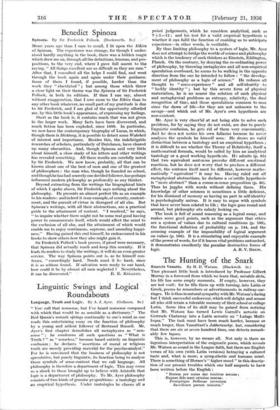Linguistic Swings and Logical Roundabouts
Language, Truth and Logic. By A. J. Ayer. (Gollancz. Os.)
" You call that nonsense, but I've heard nonsense compared with .which that would be as. sensible as a dictionary." The Bed Queen's remark springs continually to one's mind as one reads this entertaining essay on the function of philosophy by a young and ardent follower of Bertrand Russell. Mr. Ayer's first chapter demolishes all metaphysics as " non- sense " ; he condemns all such questions as " What is Truth ? " as " senseless," because based entirely on linguistic confusion ; he_ declares " assertions of moral or religious truth are merely providing material for the- psyeho-analyst." For he is convinced that the business of philosOphy is not speculative, but purely linguistic, its function being to analyse those symbols of sense-content that we call language. All philosophy is therefore a department of logic. This may come as a shock to those brought up to believe with Aristotle that logic is a department of philosophy. To Mr. Ayer philosophy consists of two kinds of genuine propositions : a tautology and an empirical hypothesis. Under tautologies he classes all a
priori judgements,_ which he considers analytical, such as 7+5=12 ; and his test for a valid empirical hypothesis is whether it can fulfil the function of enabling us to anticipate experience—in other words, is verifiable.
By thus limiting philosophy to a system of logic; Mr. Ayer does not attempt to bridge.the worlds of science and philosophy which is the tendency of such thinkers as Einstein, Eddington, Planck. On the contrary, by.denying the co-ordinating power of philosophy, by throwing metaphysics and all-non-empirical speculation overboard, he seems to be walking in the opposite direction from the one he intended to follow : " the develop- ment of philosophy as a logic of science." He reduces all thought to " sense-experience " and all self-identity
" bodily identity " ; but by this severe form of physical materialism, he is no nearer the solution of such physical and metaphysical problems as entropy, relativity, the dual recognition of time, and those speculations common to man since the dawn of life—for they are not unknown to the savage—and which out of Mr. Ayer's own hypothesis are non-existent.
Mr. Ayer is very cheerful at not being able to solve such problems, for by saying they do not exist, are due to, purely linguistic confusion, he gets rid of them very conveniently. And he does not notice his own fallacies because he never analyses the symbols he himself uses.- He draws no valid distinction between a tautology and an empirical hypothesis ; it is difficult to see whether the Theory of Relativity, itself a mathematical formula, would be called by him an analytical tautology or a good working hypothesis. He admits (p. 85) that two equivalent sentences provoke -different emotional reactions, but he does not worry that to produce a different effect, the sentence itself must be different, however mathe- matically " equivalent " it may be. Having ruled out all metaphysical abstractions, he declares a Eeentilic hypothesis is "more abstract" than a common-sense proposition (p. 46). Thus he juggles with words without defining them. His knowledge of other sciences is sometimes a little deficient, for his dismissal of memory as having no part in self-identity is psychologically untrue. It .is easy to argue with symbols that have never been related to life ; the logic goes round and around, but philosophy sits calmly looking on
The book is full of sound reasoning as a logical essay, and makes some good points, such as the argument that ethics are a system of values due to cultural conditions (p; 168), the functional definition of probability on p. 144, and the amusing example of the impossibility of logical argument on values (p. 166). It is a stimulating and enjoyable example of the power of words, for if it leaves vital problems untouched, it demonstrates excellently the peculiar destructive forces of














































 Previous page
Previous page